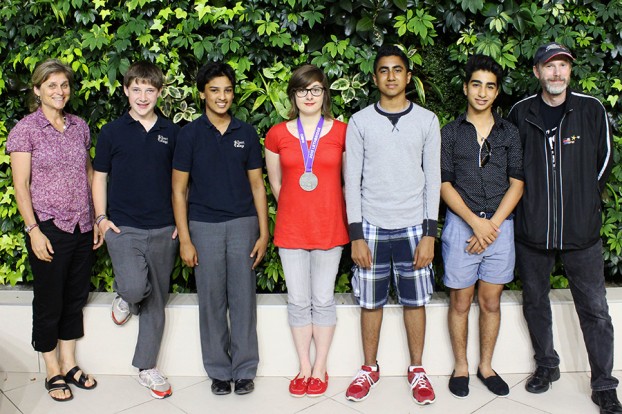Quinte’s top young scientists return from Canada-Wide Science Fair

By Greg Murphy
They started as competitors. Across the country a month later, they became teammates.
Five Quinte youths with a passion for science travelled to Lethbridge, Alberta, to join 481 others at the Canada-Wide Science and Technology Fair (CWSF). Each created projects that were tested against the scrutiny of the public, other students, and the fair judges.
Their journey started a month earlier at the regional fair in Belleville.
They became Team Quinte; representatives of the Quinte region at Canada’s “largest extra-curricular youth activity related to science and technology,” according to the fair website.
“We looked out for each other, we look at ourselves as a team. We represented Quinte as best we can,” said Govind Pisharodi a student of Moira secondary school.
Pisharodi, along with Theresa DeCola of Bayside secondary school; Aaron Morrison; Brandan Ranjith; and Aysar Younes all of Albert College, advanced to Lethbridge.
“It was fantastic to learn we were going, not only did we get to meet like minded individuals, but we got to see a part of the country most of us have never seen before,” said DeCola.
They arrived at the University of Lethbridge on May 11 with two delegates from Quinte; Scott Berry, a retired teacher from Susanna Moodie Elementary School, and Jane Moodey, a science and math teacher from Albert College.
The five were quickly put to work presenting their projects for the second time
There were four separate public viewings before projects were judged. Interacting with the public allowed the students to sharpen their knowledge.
Days started early and ended late.
When the students were not showing their projects, they enjoyed activities at the university, and exploring.
“It was really interesting to learn about the ways of the Blackfoot people and the other natives of the land. We took about 1000 pictures each,” said DeCola
The competitiveness dissolved leaving only companionship.
There was even a sense of companionship amongst the other students attending the fair. Every night in the ballroom, students mingled with each other. It became a culture of building connections and making new friends.
“After being at the Canada-Wide science fair again, I ended up meeting my friends and seeing them again the next year. I have quite a few of them on Facebook,” said DeCola.
The students invented their own activities to get to know each other.
Pin trading became the unofficial sport of the fair said Berry. It involved trading pins from students of every province. The goal was to have pins from across the country.
DeCola was one of the students whose hard work paid off. She won a silver medal for her project on environmental biology.
“In a way, we’re really a team. If one of us wins, we all win. That’s because we helped each other make sure we were ready for the judges. So really it was a group effort,” DeCola said.
The students said it was worth missing a week of school
“Most people when you tell them ‘I’ve been gone the past week to a science fair’ they don’t think what we think. They think ‘oh boring, you’ve been gone just doing work’ and its not very entertaining. What they don’t know is the experiences and amazing people you meet,” said Younes.
 Print This Post
Print This Post






